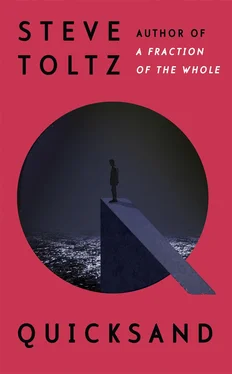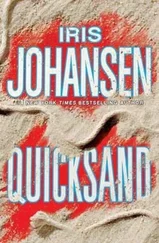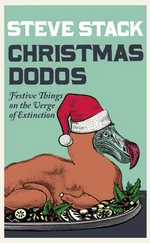To give the paragraph time to sink in, he nudged a discarded Vicks inhaler with his boot and flipped on a single-setting exhaust fan that blew his own musty odour around the room. I sat impassively in the plastic orange chair, trying to remember how I act when genuinely fascinated. Amber dusklight fell across the ordered row of desks. Outside, the car park was emptying. Draughts were coming up through a rough join in the floor. Morrell stared out the window and yelled, ‘Don’t feed the pigeons, Henderson!’ then swiftly moved back to the blackboard and wrote: It’s important to always take sides. Both sides , before he turned to check my face for rapt attention. ‘You OK?’ he asked. I looked down at the kind of carpet you wouldn’t want to bring into contact with exposed skin. He stepped closer, and for a second I thought he was going to reach for my hand or pat my shoulder. ‘I know what it is to lose someone,’ he said. My jaw tightened. I was close to tears, sniffling prematurely. There was nothing I could do, apparently, to hide the hairy goitre of loss and acute sadness emanating from my person.
The previous year, my big sister Molly had been crossing the street when she was struck and killed by a junior police officer during a high-speed chase on the Shortland Esplanade in Newcastle’s East End. The judge asked if we wished to prepare a victim impact statement, but my mother had difficulties expressing herself without plagiarising another mother’s grief. Since we all wanted Probationary Constable John Green to suffer the way we had — or at least receive the harshest possible sentence — I agreed to try my hand at writing the statement. Over a long, queasy night I wrote how Molly’s death constituted an anti-miracle and that we had become axes and wood, chopping ourselves to death and since the hit-and-run, we felt ashen, hexed, skewed, exploded and downsized in heart and soul, and feared roads, cars, telephones, rain, birds and had full-blown panic attacks in the presence of sirens and police strobes and fading tail-lights and dreaded the sight of braids, orthodontics, low-set ears, anything that reminded us of Molly: halter tops, out-of-date perms, women, and those men she would never marry — that is to say, all men … It occurs to me now that Probationary Constable John Green’s eight-month minimum-security sentence — my earliest taste of success — solidified me on the path of the artist (or, as Morrell often writes it, the artist, with a very small—8 point — lower case ‘a’.) It was in a naked bid to prolong the limelight that I’d shown Morrell my statement with the proclamation that I was thinking of turning it into a short story for the Sydney Morning Herald Young Writer of the Year competition — that’s what had excited him into this impromptu unsolicited after-class master class. (My statement also, incidentally, won me my parents’ grudging approval. Prior to the constable’s conviction, they had been less than encouraging of my early teenage creative efforts: short stories on my father’s same-sex infidelities, then on Molly’s body dysmorphia, and finally a one-act play in which I portrayed them as rapists and made them play themselves in the production.)
Morrell continued. He wrote: Forget the pram in the hallway — the only enemy of art is unrelenting sexual thoughts. And: The first step is admitting all your novel-writing fantasies begin with you typing the words ‘The End’. And: The good thing about being a beginner is you know precisely the value of your work (zero cents). He suddenly lurched and fondled the louvred shutters that hung by a thread, in order to intercept Aldo who was peering in through the smeared window, doing a masturbation pantomime. Morrell waved at him as if from a parade float, and wedged the window open slightly to allow his voice to carry outside. Aldo leaned his elbows on the sill and made a disdainful face I studiously ignored. In truth, I felt grateful and flattered to be the focus of Morrell’s attention in the semester before he quit teaching to pursue his painting career, as he always threatened to do, even when I had to endure an advice spree taken verbatim from his own 211-page, single-paragraph hectoring screed, that Aldo thought impenetrable and hypnotically dull but I appreciated — and not just because the word ‘masturbatory’ occurred twenty-seven times — and that he now copied from onto the blackboard, writing to not freak out when your one-trick pony dies , and that a writer, if that’s what I was to become, needs a sniper’s awareness of landscape + a sinister impulse to show reality its own face + a hunter’s sense of hearing + a bedridden personality type + a consumptive’s reading habits + an interior life like an iron lung + an open mind in regards to lumbar support + a visceral connection to the written word + a keen interest in capitalising on the tragedies of your time + a capacity to live without exterior validation + an irresistible curiosity that gives you the moral right to eavesdrop or stalk almost anyone on the planet earth. Each phrase he aggressively underlined until the blackboard made the classroom look like the situation room in a madman’s HQ.
All this time I was inert, with an increasingly befuddled grin. From the window Aldo said loudly, ‘Jesus Christ Almighty,’ and walked away. Morrell now began to write aphorisms I didn’t understand. You can be wounded by applause but some standing ovations are lethal. And: There but for the grace of God goes God, as well as explicit warnings that seemed to prod and twang my entire nervous system: As soon as you’ve found yourself a fallback career, you will fall back on it. Whatever you do, don’t gain an unrelated skill or gather specialised knowledge or master any kind of profession — once you’re ‘qualified’ you’re on the hook for life. His gluey eyes seemed to hold melancholy secrets when he said, ‘Most importantly, Liam, you have to find your natural subject.’ ‘What’s that?’ I asked. He smirked, slapped a nicotine patch on his arm and said, ‘That’s for God to know and you to find out.’ This was the last thing he said that afternoon. I remember Morrell stepping on his polarised sunglasses, which had tumbled from his top pocket when he bent down, and then doing what looked like calf stretches as he examined the blue bucket brimming with old rainwater that had leaked through the black mould in the cork ceiling, that the Parent Teacher Association was up in arms about. The most dominant aspect of this memory, however, was how strangely at ease I felt alone with Mr Morrell that afternoon, so devoid of my usual acute paranoia of authority figures I didn’t once hallucinate the sound of a zipper when my back was turned.
II
In the decade after high school, on the hunt for my elusive natural subject, I wrote copiously about my childhood fascination with spontaneous combustion, quicksand, piranhas, the bubonic plague, time capsules, the equator, stowaways, giant squid, narcolepsy, and a mission I undertook when I was seventeen to seek out our city’s hunchbacks (we have two). I also wrote about my several love affairs with bisexuals of both genders, and how I wound up doing the kinds of jobs usually taken by illegal immigrants or prisoners on day release — that is, how I started at the bottom and worked my way sideways, from dishwasher in an Italian restaurant to dishwasher in a Japanese restaurant, from cashier in a sporting goods store to cashier in a pet store, and on and on, manning hotlines, donning fast-food uniforms, turning back people who’d wandered in to use the toilet, waiting for customers to ask directions to our competitors, barely tolerating my co-workers’ we’re-all-in-the-same-boat faces, and following the orders of bosses who seemed to have no stomach for nooses or razor blades so were trying to kill themselves by their general attitude. The problem was twofold: nothing I wrote was any good, and living my own life vicariously had a cool, distancing effect. Instead of relationships I had exploits, instead of affairs I had escapades. I began to suspect that in my soul, something sinister and carnivorous had replaced curiosity, and I had purposely sought out an itinerant work life and found inappropriate men and women to fuck and nuzzle in cheaply decorated bedrooms just for the material. The unexpected exclamation point to this era came the morning after a one-night stand with a pale-skinned waitress with a barcode tattoo who called me a star fucker as I tried to sneak out the door. I turned and said, ‘What does that mean? Who’s a star, you?’ Apparently she’d been on a TV soap for a season and assumed my interest was based on her ‘celebrity’. When she realised I didn’t know who she was she cracked up laughing, which I thought was pretty irresistible. Her name was Tess, and eleven months later I found myself a married man in a delivery room tensely gripping her hand in a too-late-for-an-epidural situation as she was upstaged by the real star’s grand, urgent entrance. As Tess wept, holding our brand-new raging red baby, Sonja, I remember detecting underneath my love, shock and awe a well of pressure in my chest and the certainty that if I didn’t succeed in my writing now, it would forever remain a hobby.
Читать дальше











